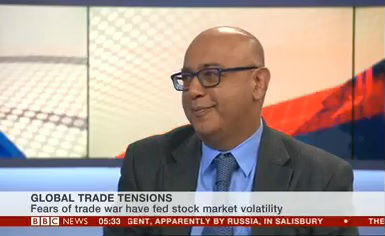Trump 'increasing global trade tensions' - Reading in the news Fri 16 Mar
16 March 2018

Here is Friday’s media round-up.
Trump deficit demand: BBC News’ The Briefing show on BBC One (3 mins) interviewed Professor Rajneesh Narula (Henley Business School), who argued Donald Trump was increasing global tension in trying to apply his business experience to international trade deals, after the US President called on China to reduce its trade deficit with the US by $100bn.
Academic job sharing: Times Higher Education interviews the University of Reading’s new joint Pro-Vice-Chancellor for Research and Innovation, Professor Parveen Yaqoob and Professor Dominik Zaum, about the advantages of taking on an executive role as a job share.
Student advice: Prospects website runs an advice piece by Jennifer Corless (Student Engagement Manager) on what students starting university this autumn should pack.
Alzheimer’s and diabetes: Professor Carol Wagstaff (Food and Nutritional Sciences) spoke to BBC Radio Berkshire (1 hr 21 mins 10 secs) about research exploring the link between type 2 diabetes and Alzheimer’s disease. This rounded off a week of interviews by Reading academics for British Science Week.
Other coverage
- The Daily Star and the Express map nuclear bunkers in Britain, including the Grade II listed Region 6 War Room on Whiteknights campus, in light of escalated tensions between the UK and Russia over the poisoning of former Russian spy Sergei Skripal and his daughter.
- BBC Radio Berkshire (1 hr 17 mins 20 secs) interviewed Professor Helen Bilton (IoE) about the fines handed out to parents whose children have missed days at school.
- PhD candidate Jamie Mulholland authors an article on China.org.cn on Chinese President Xi Jinping’s rural revitalisation strategy.
- Quotes from Professor Gary Stephens (Pharmacy) appear in further articles worldwide on the nerve agent used in the Skripal case, including in NewsHub and Cyprus Mail.
- BirdGuides.com mentions a training programme delivered by the University of Reading and other agencies on neutralising poisoning events like one seen in Mozambique last month, where more than 100 vultures were found poisoned.
- Reading research (Food and Nutritional Science) that suggests champagne could be good for brain health appears in Staying Sharp. Read our news story here.
